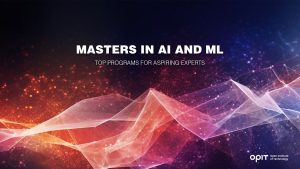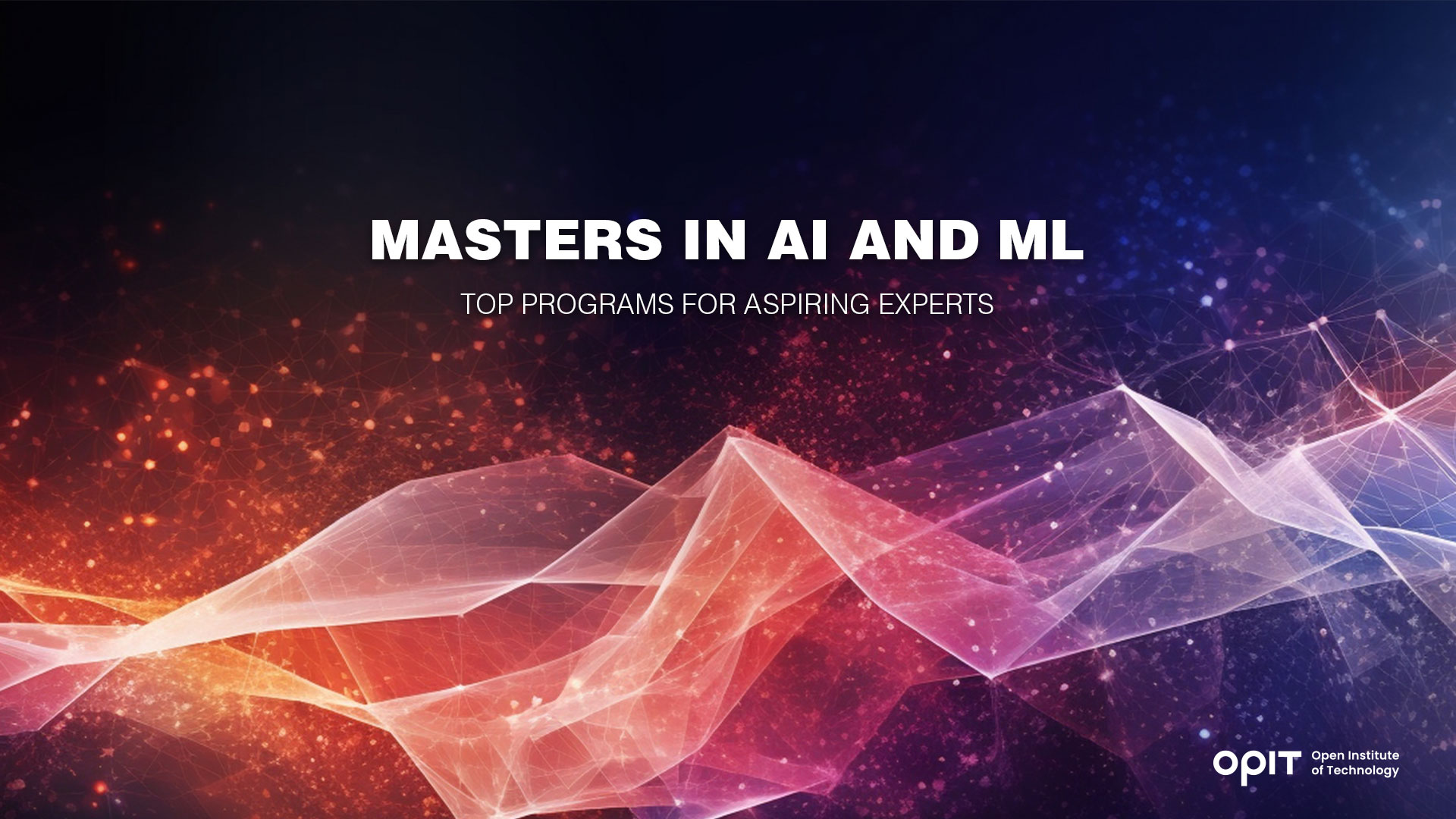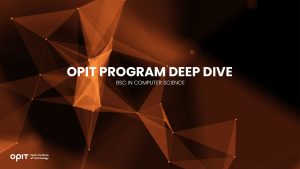

Few computer science concepts have been as popular as artificial intelligence and machine learning. Traditionally reserved for sci-fi and fantasy, these disciplines have entered the real world and been eagerly welcomed by the public. Of course, tech companies and businesses across all industries were also quick to reap the benefits of AI and ML.
Today, the job market is full of offers for experts in the two fields. More importantly, plenty of those job listings come from leading companies, representing prime career opportunities. But tech giants want genuine experts – people thoroughly educated in the field.
Getting an MSc in AI and machine learning is an excellent way to gain the knowledge, experience, and proper credentials to land some of the most profitable and exciting jobs in the industry. The possibilities here are almost unlimited: You can enroll at a university for live classes or obtain your master’s degree in AI and machine learning online.
We’ve compiled a list of the best programs to get your masters in AI and ML. Let’s look at what the top educational institutions have to offer.
Factors to Consider when Choosing a Masters Program in AI and ML
Picking the best masters in machine learning and artificial intelligence isn’t a straightforward choice. Many institutions offer courses on the subject, but not all of them are of equal quality. Here are the essential criteria to consider when deciding which course to take:
- University reputation and ranking: The first factor to look at is whether the university is well-regarded among current and former students, as well as internationally. A reputable institution will usually meet other quality criteria as well.
- Curriculum and course offerings: Every masters in AI and ML program will be slightly different. You should examine the curriculum closely to find out if the classes match your educational and professional goals.
- Research opportunities and faculty expertise: There’s plenty of theory in AI and ML, but the core value of these disciplines lies in practical application. That’s why you’ll want to pick a program with ample research and hands-on opportunities. On a similar note, the faculty members should be industry experts who can explain and show real-life uses of the skills taught.
- Job placement and industry connections: Besides the knowledge, top MSc in AI and machine learning programs will provide access to industry networks and the relevant job market. This will be one of the greatest advantages of enrollment. You’ll get the chance to enter the AI and MS professional landscape upon graduation or, in some cases, during the program.
- Tuition fees and financial aid: Studying at top universities can be costly and may impact your budget severely. However, that doesn’t mean you can’t get quality education without breaking the bank. You can find reasonably priced offers or financial aid methods to help you along the way.
Top 5 Masters Programs in AI and ML
1. Imperial College London – MSc in Artificial Intelligence
The Imperial College in London offers intensive AI and programming training in this MSc program. During your studies, you’ll gain the essential and advanced technical skills, as well as experience in practical AI application.
This program lasts for one year and includes full-time studying on site in South Kensington. The total fee, expressed in British Pounds, is £21,000 for UK students and £39,400 for learners from abroad. To enroll, you’ll need to meet the minimum requirements of a degree in engineering, physics, mathematics, or similar fields.
In terms of the curriculum, this program’s core modules include Introduction to Machine Learning, Introduction to Symbolic Artificial Intelligence, and Python Programming. You’ll participate in individual and group projects and have access to state-of-the-art computing labs.
Certain projects are done in collaboration with leading AI companies, representing an excellent opportunity to get in touch with acclaimed tech professionals. As a result, graduates from this program have improved chances of finding high-level work in the industry.
2. University of Tuebingen – International Master’s Program in Machine Learning
The master’s in machine learning from the University of Tuebingen is a flexible program with particular emphasis on statistical ML and deep learning. The institution ensures the lectures follow the latest trends in the ever-developing machine learning field.
You can finish the studies during the four semesters of the program or take an extra semester. In that case, you’ll be eligible for a note of distinction, depending on the quality of your thesis. Non-EU students will need to pay a fee of €1,500 per semester along with a €160 semester fee. Students from the EU and others eligible for fee exceptions will only have to cover the semester fees.
As mentioned, the curriculum is exceptionally flexible. The program features only three mandatory lectures: Probabilistic Inference and Learning, Statistical Machine Learning, and Deep Learning. All other lectures are elective, so you can tailor the program to fit your needs and goals precisely.
The lecturers at Tuebingen University, all renowned machine learning researchers, will work with you actively during the program. Owing to the institution’s interdisciplinary approach, you’ll be able to work on your thesis under the supervision of any computer science professor, regardless of their particular field of expertise.
As a partner of the Max Planck Institute, this university regularly collaborates with world-class tech professionals and innovators. And as a student of the University of Tuebingen, you’ll have the chance to meet and work with those authorities. You can even write your thesis during an apprenticeship with a leading tech company.
3. University of Amsterdam – Master in Artificial Intelligence
The artificial intelligence MSc at the University of Amsterdam is among the most comprehensive programs worldwide. It’s designed to provide students with a broad scope of knowledge about AI and its practical application.
This is a full-time, regular program that lasts for two years and takes place in the university’s Science Park. The tuition fee for Dutch, Swiss, Surinamese, or EU students is €2,314, while other learners will need to pay €16,500. It’s worth mentioning that scholarships are available for all students.
For the first year, the curriculum includes seven core courses meant to establish a strong foundation in machine learning, computer vision, and NLP. The second year consists entirely of electives, both restricted and free-choice. Of course, you’ll wrap up the program with an AI thesis.
This artificial intelligence MSc program offers excellent career prospects. Many alumni have found work in distinguished positions at leading tech or tech-adjacent companies like Google, Eagle Vision, Airbnb, and Volvo.
4. Johns Hopkins University – Artificial Intelligence Master’s Program Online
As one of the leading educational centers in the world, Johns Hopkins University provides exceptional programs and courses in numerous areas. This online AI master’s program is no different. It will give you a solid understanding of the subject in theory and practice.
To earn this degree, you’ll need to pass 10 courses in the total period of five years. Since Johns Hopkins is a U.S. university, the tuition fees are expressed in dollars. The standard fee per course is $6,290. However, this program is a part of the university’s Engineering for Professionals division, and all courses in that division are subject to a special dean’s discount. The actual price you’ll pay, therefore, will be $5,090 per course or $50,900 in total.
The core courses you’ll take will include Introduction to Algorithms or Algorithms for Data Science, Applied Machine Learning, Artificial Intelligence, and Creating AI-Enabled Systems. The rest of the curriculum will consist of six electives – you’ll have 26 to choose from.
The faculty consists of acclaimed experts, and the university has close ties with industry-leading companies. Both of which will help you build your network and connect with professionals who may help advance your career.
5. KTH Sweden – MSc Machine Learning
Housed at the university’s campus in Stockholm, this MSc in machine learning program is a part of the KTHs School of Electrical Engineering and Computer Science. The program examines different facets of machine learning and how they apply to problem-solving in the real world.
The program is broken down into four semesters and lasts for two years total, if completed regularly. Swiss and EU students need not pay fees for program application or tuition. For other learners, the tuition fee for the whole program will be SEK 310,000, while the application fee is SEK 900.
The curriculum consists of mandatory and elective classes, with the electives being conditioned. For example, you’ll need to choose a minimum of six courses from the two groups of Theory and Application Domain.
KTH has an impressive percentage of graduates who found employment – 97%. Of those, half have assumed leadership positions, and one in 10 works in a managerial role. In fact, more than half of KHTs students start working in their respective industries before getting the degree. This serves as proof of the stellar reputation that KHT enjoys nation- and worldwide.
Become an Expert in the Leading Computer Science Disciplines
Getting a masters in AI and ML can help you find your place in these highly competitive industries. Of course, it will be necessary to find a program that suits you to maximize your chances of success.
Whichever program you choose, one thing is certain: Machine learning and artificial intelligence will continue to grow in importance. With a proper education, you’ll be able to keep up the pace and may find yourself among the experts leading the progress in these disciplines.
Related posts

Computer Science is fast becoming one of the most valuable fields of study, with high levels of demand and high-salaried career opportunities for successful graduates. If you’re looking for a flexible and rewarding way to hone your computing skills as part of a supportive global community, the BSc in Computer Science at the Open Institute of Technology (OPIT) could be the perfect next step.
Introducing the OPIT BSc in Computer Science
The OPIT BSc in Computer Science is a bachelor’s degree program that provides students with a comprehensive level of both theoretical and practical knowledge of all core areas of computer science. That includes the likes of programming, databases, cloud computing, software development, and artificial intelligence.
Like other programs at OPIT, the Computer Science BSc is delivered exclusively online, with a mixture of recorded and live content for students to engage with. Participants will enjoy the instruction of world-leading lecturers and professors from various fields, including software engineers at major tech brands and esteemed researchers, and will have many paths open to them upon graduation.
Graduates may, for example, seek to push on with their educational journeys, progressing on to a specialized master’s degree at OPIT, like the MSc in Digital Business and Innovation or the MSc in Responsible Artificial Intelligence. Or they could enter the working world in roles like software engineer, data scientist, web developer, app developer, or cybersecurity consultant.
The bullets below outline the key characteristics of this particular course:
- Duration: Three years in total, spread across six terms.
- Content: Core courses for the first four terms, a student-selected specialization for the fifth term, and a capstone project in the final term.
- Focus: Developing detailed theoretical knowledge and practical skills across all core areas of modern computer science.
- Format: Entirely online, with a mixture of live lessons and asynchronous content you can access 24/7 to learn at your own pace.
- Assessment: Progressive assessments over the course of the program, along with a capstone project and dissertation, but no final exams.
What You’ll Learn
Students enrolled in the BSc in Computer Science course at OPIT will enjoy comprehensive instruction in the increasingly diverse sectors that fall under the umbrella of computer science today. That includes a close look at emerging technologies, like AI and machine learning, as well as introductions to the fundamental skills involved in designing and developing pieces of software.
The first four terms are the same for all students. These will include introductions to software engineering, computer security, and cloud computing infrastructure, as well as courses focusing on the core skills that computer scientists invariably need in their careers, like project management, quality assurance, and technical English.
For the fifth term, students will have a choice. They can select five electives from a pool of 27, or select one field to specialize in from a group of five. You may choose to specialize in all things cybersecurity, for example, and learn about emerging cyber threats. Or you could focus more on specific elements of computer science that appeal to your interests and passions, such as game development.
Who It’s For
The BSc in Computer Science program can suit a whole range of prospective applicants and should appeal to anyone with an interest or passion for computing and a desire to pursue a professional career in this field. Whether you’re seeking to enter the world of software development, user experience design, data science, or another related sector, this is the course to consider.
In addition, thanks to OPIT’s engaging, flexible, and exclusively online teaching and learning systems, this course can appeal to people from all over the globe, of different ages, and from different walks of life. It’s equally suitable for recent high school graduates with dreams of making their own apps to seasoned professionals looking to broaden their knowledge or transition to a different career.
The Value of the BSc in Computer Science Course at OPIT
Plenty of universities and higher education establishments around the world offer degrees in computer science, but OPIT’s program stands out for several distinctive reasons.
Firstly, as previously touched upon, all OPIT courses are delivered online. Students have a schedule of live lessons to attend, but can also access recorded content and digital learning resources as and when they choose. This offers an unparalleled level of freedom and flexibility compared to more conventional educational institutions, putting students in the driving seat and letting them learn at their own pace.
OPIT also aims not merely to impart knowledge through lectures and teaching, but to actually help students gain the practical skills they need to take the next logical steps in their education or career. In other words, studying at OPIT isn’t simply about memorizing facts and paragraphs of text; it’s about learning how to apply the knowledge you gain in real-world settings.
OPIT students also enjoy the unique benefits of a global community of like-minded students and world-leading professors. Here, distance is no barrier, and while students and teachers may come from completely different corners of the globe, all are made to feel welcome and heard. Students can reach out to their lecturers when they feel the need for guidance, answers, and advice.
Other benefits of studying with OPIT include:
- Networking opportunities and events, like career fairs, where you can meet and speak with representatives from some of the world’s biggest tech brands
- Consistent support systems from start to finish of your educational journey in the form of mentorships and more
- Helpful tools to expedite your education, like the OPIT AI Copilot, which provides personalized study support
Entry Requirements and Fees
To enroll in the OPIT BSc in Computer Science and take your next steps towards a thrilling and fulfilling career in this field, you’ll need to meet some simple criteria. Unlike other educational institutions, which can impose strict and seemingly unattainable requirements on their applicants, OPIT aims to make tech education more accessible. As a result, aspiring students will require:
- A higher secondary school leaving certificate at EQF Level 4, or equivalent
- B2-level English proficiency, or higher
Naturally, applicants should also have a passion for computer science and a willingness to study, learn, and make the most of the resources, community, and support systems provided by the institute.
In addition, if you happen to have relevant work experience or educational achievements, you may be able to use these to skip certain modules or even entire terms and obtain your degree sooner. OPIT offers a comprehensive credit transfer program, which you can learn more about during the application process.
Regarding fees, OPIT also stands out from the crowd compared to conventional educational institutions, offering affordable rates to make higher tech education more accessible. There are early bird discounts, scholarship opportunities, and even the option to pay either on a term-by-term basis or a one-off up-front fee.

The Open Institute of Technology (OPIT) provides a curated collection of courses for students at every stage of their learning journey, including those who are just starting. For aspiring tech leaders and those who don’t quite feel ready to dive directly into a bachelor’s degree, there’s the OPIT Foundation Program. It’s the perfect starting point to gain core skills, boost confidence, and build a solid base for success.
Introducing the OPIT Foundation Year Program
As the name implies, OPIT’s Foundation Program is about foundation-level knowledge and skills. It’s the only pre-bachelor program in the OPIT lineup, and successful students on this 60-ECTS credit course will obtain a Pre-Tertiary Certificate in Information Technology upon its completion. From there, they can move on to higher levels of learning, like a Bachelor’s in Digital Business or Modern Computer Science.
In other words, the Foundation Program provides a gentle welcome into the world of higher technological education, while also serving as a springboard to help students achieve their long-term goals. By mixing both guided learning and independent study, it also prepares students for the EQF Level 4 experiences and challenges they’ll face once they enroll in a bachelor’s program in IT or a related field.
Here’s a quick breakdown of what the OPIT Foundation Program course involves:
- Duration: Six months, split into two terms, with each term lasting 13 weeks
- Content: Three courses per term, with each one worth 10 ECTS credits, for a total of 60
- Focus: Core skills, like mathematics, English, and introductory-level computing
- Format: Video lectures, independent learning, live sessions, and digital resources (e-books, etc.)
- Assessment: Two to three assessments over the course of the program
What You’ll Learn
The OPIT Foundation Program doesn’t intensely focus on any one particular topic, nor does it thrust onto you the more advanced, complicated aspects of technological education you would find in a bachelor’s or master’s program. Instead, it largely keeps things simple, focusing on the basic building blocks of knowledge and core skills so that students feel comfortable taking the next steps in their studies.
It includes the following courses, spread out across two terms:
- Academic Skills
- Mathematics Literacy I
- Mathematics Literacy II
- Internet and Digital Technology
- Academic Reading, Writing, and Communication
- Introduction to Computer Hardware and Software
Encompassing foundational-level lessons in digital business, computer science, and computer literacy, the Foundation Program produces graduates with a commanding knowledge of common operating systems. Exploring reading and writing, it also helps students master the art of communicating their ideas and responses in clear, academic English.
Who It’s For
The Foundation Year program is for people who are eager to enter the world of technology and eventually pursue a bachelor’s or higher level of education in this field, but feel they need more preparation. It’s for the people who want to work on their core skills and knowledge before progressing to more advanced topics, so that they don’t feel lost or left behind later on.
It can appeal to anyone with a high school-level education and ambitions of pushing themselves further, and to anyone who wants to work in fields like computer science, digital business, and artificial intelligence (AI). You don’t need extensive experience or qualifications to get started (more on that below); just a passion for tech and the motivation to learn.
The Value of the Foundation Program
With technology playing an increasingly integral role in the world today, millions of students want to develop their tech knowledge and skills. The problem is that technology-oriented degree courses can sometimes feel a little too complex or even inaccessible, especially for those who may not have had the most conventional educational journeys in the past.
While so many colleges and universities around the world simply expect students to show up with the relevant skills and knowledge to dive right into degree programs, OPIT understands that some students need a helping hand. That’s where the Foundation Program comes in – it’s the kind of course you won’t find at a typical university, aimed at bridging the gap between high school and higher education.
By progressing through the Foundation Program, students gain not just knowledge, but confidence. The entire course is aimed at eliminating uncertainty and unease. It imbues students with the skills and understanding they need to push onward, to believe in themselves, and to get more value from wherever their education takes them next.
On its own, this course won’t necessarily provide the qualifications you need to move straight into the job market, but it’s a vital stepping stone towards a degree. It also provides numerous other advantages that are unique to the OPIT community:
- Online Learning: Enjoy the benefits of being able to learn at your own pace, from the comfort of home, without the costs and inconveniences associated with relocation, commuting, and so on.
- Strong Support System: OPIT professors regularly check in with students and are on hand around the clock to answer queries and provide guidance.
- Academic Leaders: The OPIT faculty is made up of some of the world’s sharpest minds, including tech company heads, experienced researchers, and even former education ministers.
Entry Requirements and Fees
Unlike OPIT’s other, more advanced courses, the Foundation Program is aimed at beginners, so it does not have particularly strict or complex entry requirements. It’s designed to be as accessible as possible, so that almost anyone can acquire the skills they need to pursue education and a career in technology. The main thing you’ll need is a desire to learn and improve your skills, but applicants should also possess:
- English proficiency at level B2 or higher
- A Secondary School Leaving Certificate, or equivalent
Regarding the fees, OPIT strives to lower the financial barrier of education that can be such a deterrent in conventional education around the world. The institute’s tuition fees are fairly and competitively priced, all-inclusive (without any hidden charges to worry about), and accessible for those working with different budgets.
Given that all resources and instruction are provided online, you can also save a lot of money on relocation and living costs when you study with OPIT. In addition, applicants have the option to pay either up front, with a 10% discount on the total, or on a per-term basis, allowing you to stretch the cost out over a longer period to ease the financial burden.
Have questions?
Visit our FAQ page or get in touch with us!
Write us at +39 335 576 0263
Get in touch at hello@opit.com
Talk to one of our Study Advisors
We are international
We can speak in:


